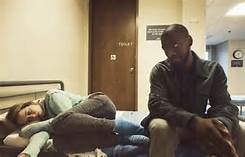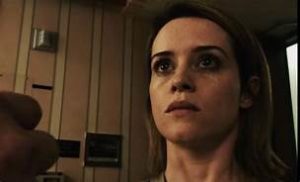For me, the single most disconcerting image in a Steven Soderbergh film is from CONTAGION. It’s not a panorama of people dying from the pandemic that threatens to end civilization as we know it, instead it’s the silent, dispassionately clinical shot of Gwyneth Paltrow’s head being autopsied. There are people I know who reference the entire film by mimicking what happens to the flesh as it is removed from the skull. As an image, it is not for the faint of heart no matter how it would have been presented, but the complete non-emotion of the moment takes it from a grisly act to one that is unbearable in it dispassionate remove from humanity, particularly as we see the grief her character’s death has caused those closest to her. Soderbergh’s latest film, UNSANE, is like 97 minutes of that same visceral experience.
The title refers to the mental state of its protagonist, Sawyer Valentini (Claire Foy), a not entirely pleasant woman, who operates in a murky in-between place when it comes to a healthy psyche. She’s very good at her job as as a bank analyst, a job that includes professionally telling off an unhappy client, and in being equally professionally while fending off the subtle but unmistakable attempt by her new boss to make their relationship something other than merely professional. Yet none of that seems to faze Sawyer. Nor does lying to her fretful mother (Amy Irving) about the great new life she has 450 miles away from home; nor explaining to the guy she met online that his evening is going to go the way he hoped, but that afterwards he is never to contact her again. It’s when she brings him home to her upscale but impersonally decorated apartment that things go very wrong for Sawyer, starting with the tiny nervous breakdown that the first passionate kiss provokes. To his credit, he leaves, bemused and a little shaken, leaving Sawyer to her handful of prescription pills and an online search for help in coping with the after effects of being stalked.
And there it is. The solution to the mystery that is Sawyer. Except, of course, it isn’t. There’s more. Much more. Little by little we are cleverly manipulated into wondering just how sane Sawyer is as the danger for which she was on her guard (and moved almost 500 miles to escape) is nothing compared the danger she never sees coming.

Claire Foy, Jay Pharoah
That would be what happens after she has a decidedly helpful session with a consultant at the clinic she finds online, only to discover the consequences of not reading the fine print of the boilerplate form she’s handed by the receptionist that agrees to a voluntary 24-hour commitment for observation. Moving without question into an exam room, surrendering her purse, her clothes, and eventually her freedom, Sawyer follows the orders given her with subtle menace by the staff who reply to her questions without actually answering them. What ensues is a tale of horror, to be sure, but it’s also a gloss on the madness of everyday life, accepted without question, or even much notice, juxtaposed with the actual madness, or lack thereof, in a mental health facility. And that’s where the real terror lies as Sawyer’s perfectly rational protests are countered with condescension or, worse, indifference from almost everyone around her. Her one ally is Nate (Jay Pharoah), a fellow inmate with a smuggled phone who takes Sawyer under his wing, but, then again, it’s the wing of a fellow inmate, so how helpful can that really be, and how much can anything he says be trusted? Still, there is comfort in his absolute reassurance that she’s not crazy, even if she does think that one of the orderlies (the teddy-bearish Joshua Leonard) is her stalker working under an assumed name.

Claire Foy
We’ve been set up to be just as suspicious of this claim as the staff, what with Sawyer explaining at her initial therapy session why her mind has played just such tricks on her in the past. We’ve also been set up to understand the claustrophobia Sawyer lives with in a series of tight close-ups in which Foy, giving a performance both raw and calculated, exposes Sawyer’s soul in all its twisted glory. We are not meant to like Sawyer, yet we are meant to care what happens to her, and Foy succeeds on both counts without pandering to us by softening the barbed wire in which Sawyer has wrapped herself, staring at us frankly, face set in a grim expression of defiance.
On the surface, UNSANE is a wonderfully disturbing horror film. There are the familiar tropes. A madman who appears to be not just sane, but also the soul of empathy, or is his presumed madness merely a projection of Sawyer’s own trauma. And, for good measure, there’s Juno Temple as the tampon-flinging roommate who delights in bringing out the very worst in Sawyer, which results in the latter’s confinement being extended for an extra week, or, according to Nate, until her excellent insurance runs out, whichever comes first. Beneath that overt horror is something far more sinister as the subtext of power struggles runs rampant. Sawyer’s boss skating carefully around legality, and the only solution to a stalker problem that the law can provide Sawyer is an essentially toothless restraining order. The rest is on Sawyer, including, and without question, upending her life by moving to a new city, and hiring a consultant (yes, that is a familiar face in an ominously wholesome cameo) to explain that fear is her friend, and that Facebook isn’t. That he is so matter-of-fact with a whiff of chipperness adds the proper surreal element to a situation in which Sawyer is punished with emotional turmoil and PTSD, while her stalker will suffer consequences only if he comes closer than the restraining order allows.
UNSANE transcends the gimmick that that it was shot entirely on an iPhone such that you need to be told that it was. Nothing in the tracking shots, tight close-ups, or vertiginous simulacrums of madness rendered visible smacks of anything less than perfection of the cinematographer’s art. It also transcends its genre, using horror as a skin-crawling vehicle of social criticism that roundly damns sexism, racism, capitalism, and, for good measure, the mis-pronunciation of high-end coffee drinks.
Your Thoughts?